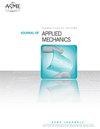Architected Piezoelectric Metamaterial with Designable Full Nonzero Piezoelectric Coefficients
IF 2.8
4区 工程技术
Q2 MECHANICS
引用次数: 0
Abstract
Piezoelectric metamaterials have received extensive attention in fields of robotics, nondestructive testing, energy harvesting, etc. Natural piezoelectric ceramics possess only five nonzero piezoelectric coefficients due to the crystal symmetry of 8mm, which has limited the development of related devices. To obtain nonzero piezoelectric coefficients, previous studies mainly focus on assembling piezoelectric ceramic units or multiphase metamaterials. However, only part of the nonzero piezoelectric coefficients or locally piezoelectric electromechanical modes are achieved. Additionally, it still remains challenge for manipulating the piezoelectric coefficients in a wide range. In this work, full nonzero piezoelectric coefficients are obtained by symmetry breaking in architected piezoelectric metamaterial. The piezoelectric coefficients are designable over a wide range from positive to negative through manipulating the directions of the three-dimensional architected lattice. The architected metamaterials exhibit multiple positive/inverse piezoelectric modes, including normal, shear, and twist deformation in different directions. Finally, a smart gradient architected piezoelectric metamaterial is designed to take advantage of this feature, which can sense the position of the normal and shear force. This work paves the way for the control of piezoelectric metamaterial in a wide range with designable full nonzero piezoelectric coefficients, thereby enabling application potential in the fields of intelligent actuation and sensing.具有可设计全非零压电系数的结构压电超材料
压电材料在机器人、无损检测、能量收集等领域受到广泛关注。天然压电陶瓷由于晶体对称性为8mm,只有5个非零压电系数,限制了相关器件的发展。为了获得非零压电系数,以往的研究主要集中在组装压电陶瓷单元或多相超材料上。然而,只能实现部分非零压电系数或局部压电机电模态。此外,如何在大范围内控制压电系数仍然是一个挑战。本文通过对称破缺的方法获得了结构压电材料的全非零压电系数。通过操纵三维结构晶格的方向,压电系数可以在从正到负的广泛范围内设计。结构的超材料表现出多种正/逆压电模式,包括不同方向的法向、剪切和扭转变形。最后,利用这一特性设计了一种智能梯度结构的压电超材料,该材料可以感知法向力和剪力的位置。本研究为具有可设计的全非零压电系数的压电超材料在大范围内的控制铺平了道路,从而使其在智能驱动和传感领域具有应用潜力。
本文章由计算机程序翻译,如有差异,请以英文原文为准。
求助全文
约1分钟内获得全文
求助全文
来源期刊
CiteScore
4.80
自引率
3.80%
发文量
95
审稿时长
5.8 months
期刊介绍:
All areas of theoretical and applied mechanics including, but not limited to: Aerodynamics; Aeroelasticity; Biomechanics; Boundary layers; Composite materials; Computational mechanics; Constitutive modeling of materials; Dynamics; Elasticity; Experimental mechanics; Flow and fracture; Heat transport in fluid flows; Hydraulics; Impact; Internal flow; Mechanical properties of materials; Mechanics of shocks; Micromechanics; Nanomechanics; Plasticity; Stress analysis; Structures; Thermodynamics of materials and in flowing fluids; Thermo-mechanics; Turbulence; Vibration; Wave propagation

 求助内容:
求助内容: 应助结果提醒方式:
应助结果提醒方式:


